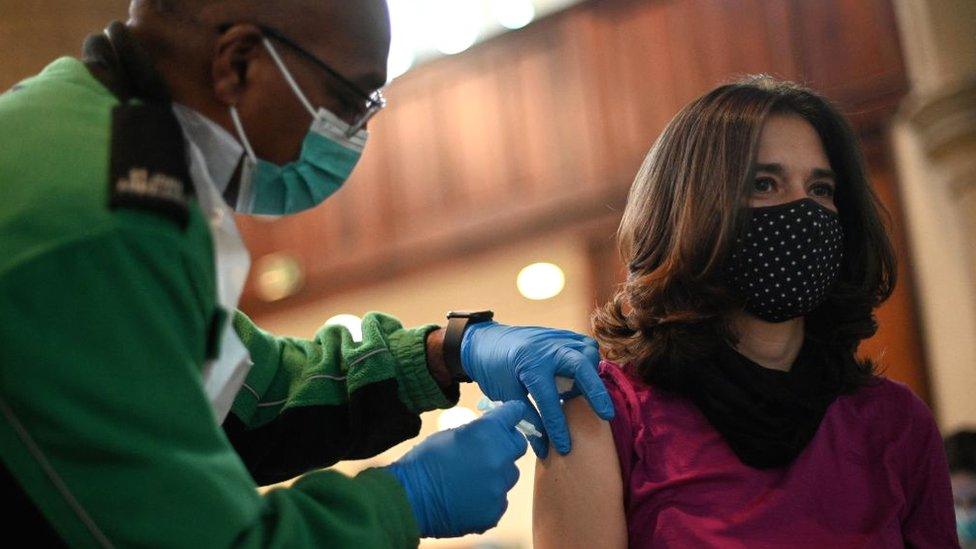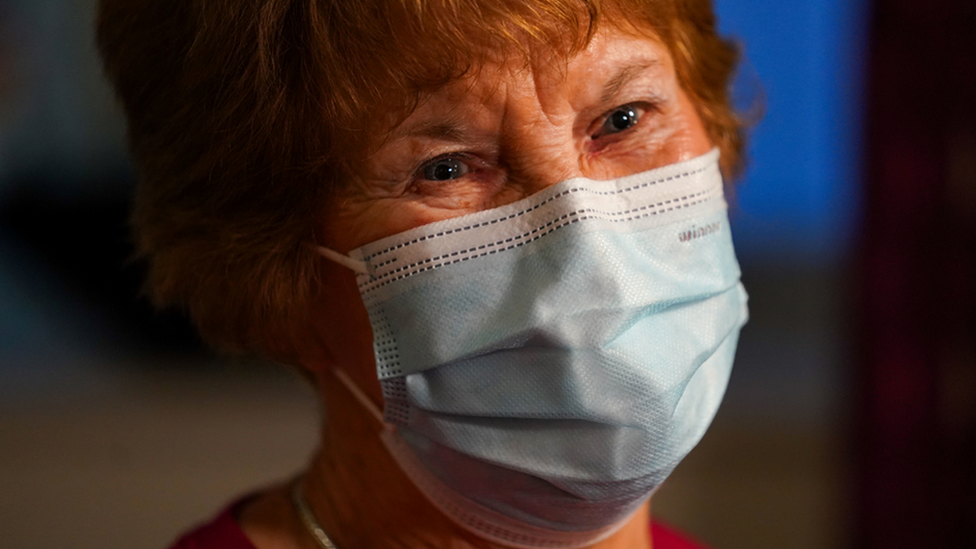Ministers considering move to Covid Plan B - source
- Published
- comments

Boris Johnson will hold a press conference shortly, after ministers are understood to have held talks on moving England to Covid Plan B.
Measures discussed at the Covid Operations committee are thought to include working from home, face masks and some form of Covid certification.
The government is trying to slow the spread of the Omicron variant so more people can get their booster jabs.
Covid cases continue to rise, with another 51,342 people testing positive.
The latest figures, external also recorded 161 deaths of people who tested positive within 28 days of a positive test.
Mr Johnson will appear alongside England's chief medical officer Prof Chris Whitty and the UK's chief scientific adviser Sir Patrick Vallance at the news conference at 18:00 GMT.
When asked earlier in the Commons about media reports that Plan B was under consideration, the prime minister did not deny it, telling MPs no decisions would be taken without first consulting the cabinet.
It comes on the same day that government adviser Allegra Stratton resigned after an angry backlash over a video of her and other No 10 staff joking about holding a Christmas party last year.
Earlier, the prime minister apologised for the video, saying he had been "repeatedly assured that there was no party". He has ordered an inquiry into whether rules were broken.
Working from home is a key plank of the government's Plan B contingency measures aimed at protecting the NHS from "unsustainable pressure".
Earlier on Wednesday, government adviser Prof Neil Ferguson said telling people to work from home would allow more time to administer booster jabs while case numbers of the Omicron variant were doubling "at least every three days, maybe every two days".
He said the variant was likely to overtake Delta to become dominant in the UK before Christmas.
The number of people needing hospital treatment from Omicron could reach at least 1,000 a day in England by the end of the year if extra restrictions are not put in place, according to leaked minutes from Tuesday's meeting of the Scientific Advisory Group for Emergencies seen by the BBC.
Currently about 680 people are admitted to hospital each day in England with the Delta variant.
At the peak of the last winter wave of coronavirus, hospitals in England were admitting 3,811 people a day infected with the virus.
The minutes say: "With the speed of growth seen, decision makers will need to consider response measures urgently to reduce transmission if the aim is to reduce the likelihood of unsustainable pressure on the NHS."


It is now clear Omicron is spreading rapidly.
Ignore the official total of confirmed Omicron infections - just over 500 - as this is the tip of the iceberg. Less than a fifth of infections are checked for variants and there is a 10-day lag in getting these results.
From testing data, experts believe there could be more than 1,000 infections a day.
With cases doubling every three days or so, Omicron will soon become dominant in the UK.
But what remains hugely uncertain is what that will mean for serious illness.
The prediction of 1,000 admissions a day by the end of the year - made in Sage minutes leaked to the BBC - comes with a huge margin of error.
There are suggestions the variant is causing milder illness - and that certainly makes sense as reinfections or infections post vaccination are likely to not be as serious.
But even if that is the case, a rapid rise in infections still has the potential to cause more hospitalisations than we are seeing now.
That is why extra measures are being considered. The aim is not to stop the spread, but rather slow it to give more time to rollout the boosters and limit the pressure on the NHS.

From testing, data experts believe around 2% of positive cases - approaching 1,000 a day - could be Omicron.
The World Health Organization says existing vaccines should still protect people who contract the Omicron variant from severe illness.
It comes as the first lab tests of the new variant in South Africa suggest it can partially evade the Pfizer jab.
But Dr Mike Ryan, the WHO's emergencies director, said there was no sign that Omicron would be better at evading vaccines than other variants.
He said initial data suggested Omicron did not make people sicker than Delta and other strains. "If anything, the direction is towards less severity," he added.
From Wednesday, people aged 40 and over in England can now book their booster jab for three months after their second dose.
Last week, face coverings became mandatory again on public transport and shops in England, bringing it in line with Scotland, Wales and Northern Ireland.
Another recent change required all contacts of suspected Omicron cases to self-isolate for 10 days, even if they are fully vaccinated.
Earlier in the pandemic, regional and nationwide lockdowns were put in place to try to stem the spread of the virus.
But ministers have repeatedly said there are no plans for another lockdown in England.
Additional reporting by Dulcie Lee

'HE LIVED FOR HIS MUSIC': The extraordinary story of Freddie Mercury and his battle with AIDs
WHAT'S SUPERMAN LIKE AS A DAD? Even as a parent, a superhero is never off duty

Related topics
- Published8 December 2021

- Published1 July 2022

- Published8 December 2021

- Published8 December 2021

- Published2 April
